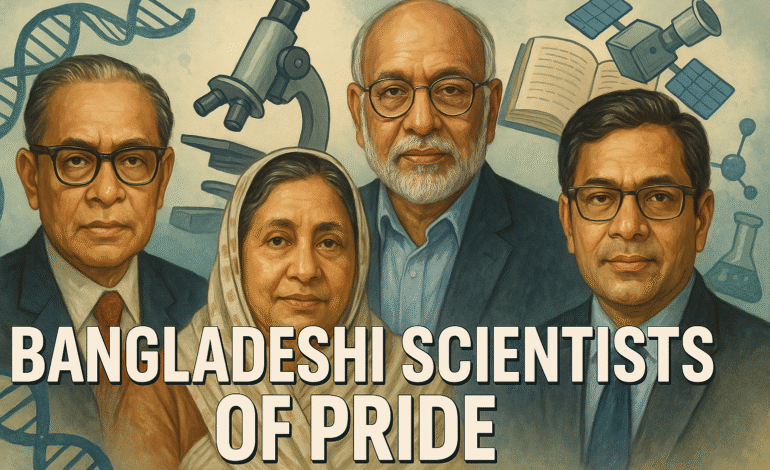Bangladeshi Scientists: 10 Powerful Stories of Pride

Bangladeshi Scientists: 10 Powerful Stories of Pride
When people talk about science, Bangladesh is rarely the first country that comes to mind. Yet, the truth is different. Bangladeshi scientists have made remarkable contributions in fields such as medicine, agriculture, physics, chemistry, and climate change. Their work has saved lives, improved food security, and advanced global knowledge. Unfortunately, their stories often remain hidden from the mainstream.
According to UNESCO, science has no boundaries, and researchers from smaller nations also contribute to solving global challenges. Similarly, The Guardian notes how scientists from developing countries often work in silence but deliver innovations that impact millions. In this context, Bangladesh has a legacy that deserves attention and recognition.
This article explores the lives and achievements of Bangladeshi scientists who prove that the nation has every reason to feel proud.
Why Bangladeshi Scientists Deserve Recognition?
Science thrives when innovation meets determination. Despite limited resources, Bangladeshi scientists have consistently overcome obstacles. They have contributed to vaccine development, agriculture, climate change adaptation, and water purification. Their research not only benefits Bangladesh but also addresses global challenges.
From decoding the jute genome to inventing low-cost water filters, their impact has been far-reaching. Many of these scientists have received international awards, grants, and global recognition. Still, their names are less familiar compared to Western scientists. It is time to highlight their work and celebrate their contributions.
Qudrat-i-Khuda: A Pioneer of Modern Science in Bangladesh
Among the earliest Bangladeshi scientists, Dr. Qudrat-i-Khuda stands out as a pioneer. He was a chemist and educationist who made important contributions to nutrition and agricultural research. He played a key role in establishing scientific institutions in Bangladesh after independence. His research on food and energy resources supported the country during its formative years.
He remains an inspiration for young researchers who want to combine scientific discovery with national service.
Jamal Nazrul Islam: The Voice of Cosmology
Dr. Jamal Nazrul Islam is remembered worldwide for his groundbreaking work in mathematical physics. His research focused on cosmology and the theory of relativity. He published widely on topics related to the universe and its origins.
As one of the most prominent Bangladeshi scientists, he showed how a scientist from Bangladesh could contribute to one of the most complex fields of modern science. His books and papers remain widely respected, and his life story continues to inspire physicists and mathematicians.
Maqsudul Alam: Decoding the Jute Genome
Dr. Maqsudul Alam brought Bangladesh into the global spotlight when he led the team that decoded the genome of jute. Known as the “golden fiber,” jute has been central to Bangladesh’s economy for centuries. His research opened new possibilities for improving jute quality and creating eco-friendly products.
He also worked on sequencing the genomes of papaya and rubber, contributing to global agricultural science. His work ensured that Bangladesh became a significant player in the field of genomics.
Firdausi Qadri: Champion of Public Health
One of the most celebrated Bangladeshi scientists today is Dr. Firdausi Qadri. She is internationally recognized for her research in developing vaccines against cholera and typhoid. Her work at icddr,b in Dhaka has saved countless lives in vulnerable communities.
In 2021, she received the Ramon Magsaysay Award for her contribution to public health. Her leadership demonstrates how Bangladeshi science can provide solutions to pressing health crises in developing countries.
(You can learn more about her work from icddr,b.)
Abul Hussam: Inventor of the Arsenic Filter
Dr. Abul Hussam won the Grainger Challenge Prize in 2007 for inventing the Sono arsenic filter. This low-cost technology provides safe drinking water by removing arsenic, which has been a deadly problem in Bangladesh.
His invention has improved the lives of millions of rural families. This achievement shows how Bangladeshi scientists innovate with local problems in mind while providing solutions with global significance.
Samir Kumar Saha: Saving Children’s Lives
Dr. Samir Kumar Saha is a microbiologist whose research on pneumonia and meningitis has influenced child health policies worldwide. His work has guided vaccine programs in Bangladesh and other developing countries.
As an expert in infectious diseases, he has received recognition from international organizations such as WHO. His dedication proves that Bangladeshi science can lead in the global fight against preventable diseases.
Saleemul Huq: Climate Change Visionary
Dr. Saleemul Huq was one of the most influential climate scientists in the world. He dedicated his career to helping vulnerable countries adapt to climate change. He advised governments, wrote extensively, and contributed to the reports of the Intergovernmental Panel on Climate Change (IPCC).
As one of the most respected Bangladeshi scientists, his work ensured that Bangladesh became a global voice for climate adaptation. He was listed among the top global climate influencers by international organizations.
Mohammed Ataul Karim: Innovator in Engineering
Dr. Mohammed Ataul Karim is known for his contributions to electrical engineering and optics. His research has covered imaging systems and computer engineering, and he has served as an academic leader in several universities abroad.
His journey shows how Bangladeshi scientists have excelled not only in health and agriculture but also in advanced engineering fields.
Abdus Suttar Khan: Contributions to Aerospace
Dr. Abdus Suttar Khan worked with major organizations like NASA and General Electric in the United States. He specialized in aerospace materials and helped develop advanced alloys used in jet engines.
His story reminds us that Bangladesh has produced scientists whose innovations reached the skies. His contributions in aerospace engineering underline the global reach of Bangladeshi talent.
The Legacy of Bangladeshi Scientists
Each of these Bangladeshi scientists demonstrates that the country has a proud history of scientific contributions. Their research addresses some of the biggest challenges of our time: clean water, deadly diseases, climate change, and sustainable agriculture.
Despite facing limited funding, lack of recognition, and sometimes political obstacles, they persisted. Their stories are powerful reminders that science is not limited by geography. What matters most is vision, commitment, and resilience.
Bangladesh’s future depends on encouraging young people to follow in their footsteps. Investments in research, education, and infrastructure will ensure that new generations of scientists continue to make us proud.
The world may not always associate Bangladesh with science, but reality tells another story. Bangladeshi scientists have been innovators, problem-solvers, and pioneers. From laboratories in Dhaka to research centers abroad, they have left their mark.
Their stories are not just tales of personal success. They are national achievements that belong to all Bangladeshis. It is time to celebrate these heroes and inspire future generations to dream big, think boldly, and continue building a legacy of science and discovery.







